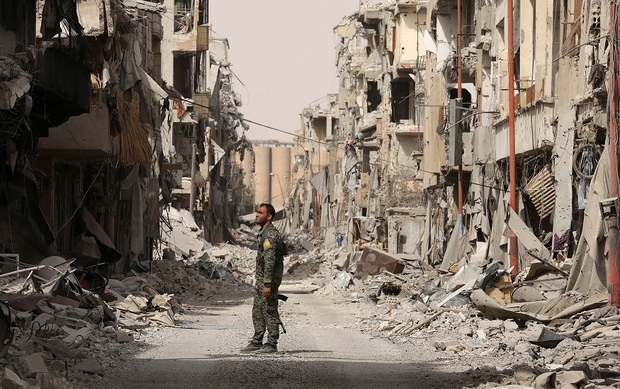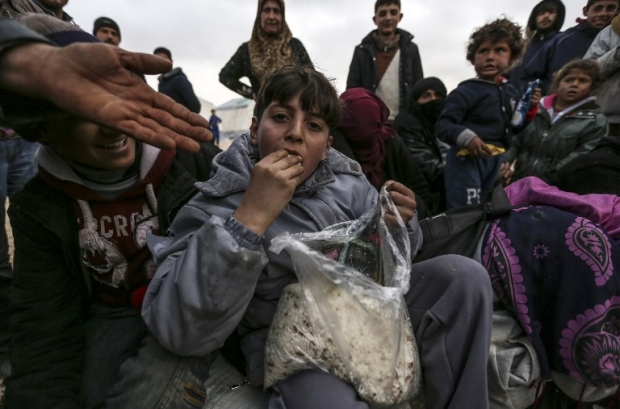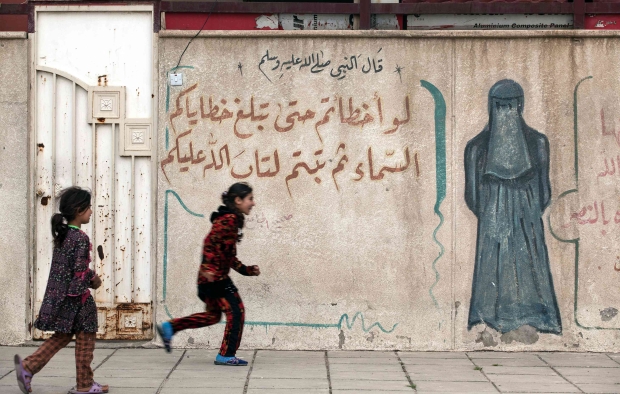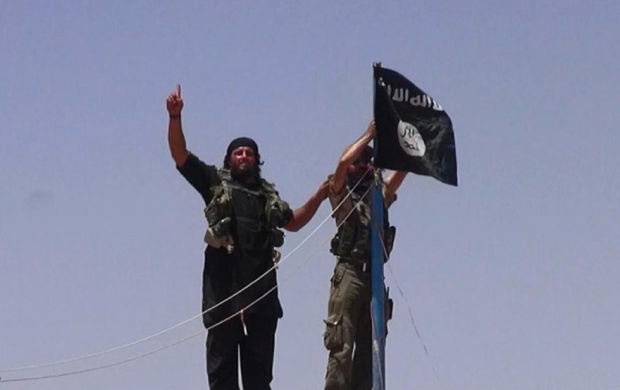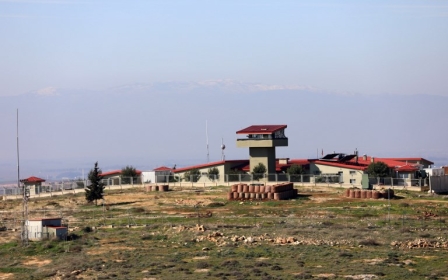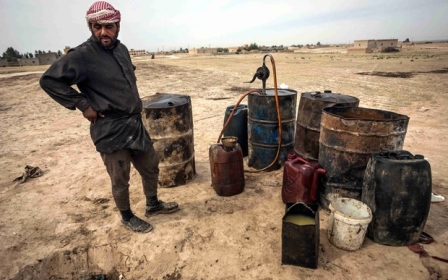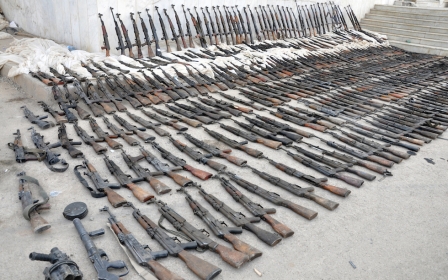The network: A virtual hunt for Islamic State fighters fleeing Syria
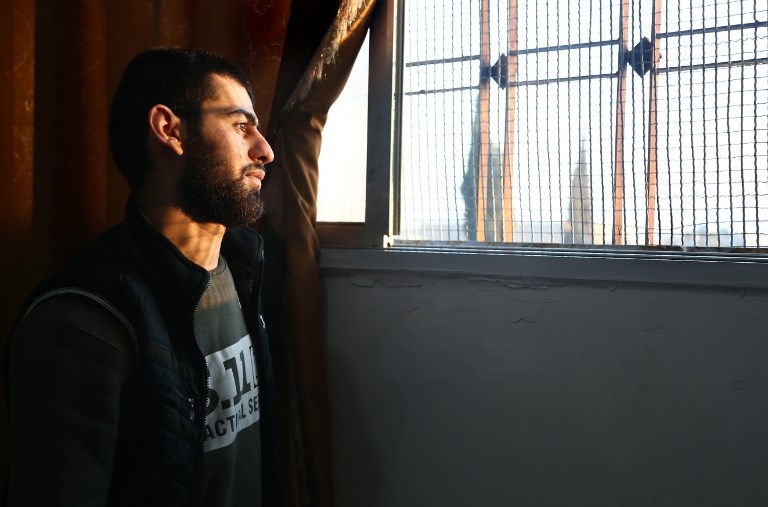
Aghid al-Khodr wakes up early, before the sun rises. At his home in an undisclosed location in Germany, he begins his work.
For the next 15 hours, he sits with his mobile phone, sifting through pictures and audio recordings posted on a secret WhatsApp group.
The faces on his screen - old, young, travel-weary - are those of refugees passing through checkpoints in northern Syria after leaving what was until recently Islamic State territory.
'These people committed crimes against us. They tortured us, killed our relatives and closest friends'
- Aghid al-Khodr, activist
Some are fleeing ongoing battles in the last of IS territory in Syria's east. The voice messages are brief: name, age, tribal affiliation, occupation.
The 27-year-old is part of a year-old network of hundreds of unpaid civilians, activists and Free Syrian Army (FSA) fighters from former IS-held eastern regions who are working from wherever they are in the world to identify IS members, past and present.
"These people committed crimes against us," said Khodr. "They tortured us, killed our relatives and closest friends."
Khodr comes from Syria's eastern Deir Ezzor province, much of which IS has controlled for more than three years.
He was one of the founding members of the anti-IS Raqqa is Being Slaughtered Silently (RBSS) media campaign, and has worked as an anti-IS media activist for years. In 2015, he fled his Deir Ezzor home after IS raided it, and ultimately settled in Germany.
Over the past year, Khodr watched from his new home as separate offensives by US-backed forces and by the Assad government against IS in Syria picked up tempo, with the violence sparking a huge flow of refugees.
By the end of 2017, IS had lost the vast majority of its territory, and more than half a million people were displaced.
The more people fled, al-Khodr says, the more he and some fellow Syrian activists worried that IS members could disappear by adopting new identities and melting into the throngs of desperate civilians fleeing the violence.
That concern sparked the idea for an organised, crowdsourced network to identify them.
This is how Khodr said it works: when a displaced person comes to one of dozens of checkpoints in FSA-held territory en route to western Aleppo, Idlib or Turkey, FSA personnel take their picture and record their voice as they state their identity and hometown.
Those images and sound files are posted onto a handful of secret groups - two on WhatsApp and one on Telegram.
Then, volunteers such as Khodr spend hours going through the material in an effort to identify any IS members they can. They cross-reference pictures with IS media, reach out to activists, civilians, friends and family members from the area that each individual says they are from. Contacts currently inside IS territories in eastern Syria provide additional information.
Khodr claims that the network has identified 2,500 suspected IS members over the past year. One FSA spokesman affiliated with the group told Syria Direct that 1,000 people had been caught at one major, northern Aleppo checkpoint alone.
Syria Direct could not independently confirm the figures, but spoke with three sources working with the groups who gave similar accounts.
"The tribal nature of society in Deir Ezzor and Raqqa has greatly helped us," said Khodr. "It's relatively easy to find out who a person is, their background and relatives."
Each of the three private messaging groups has between 120 and 290 members, in addition to several sub-groups divided by specialties, to facilitate work. Group administrators assign individual cases among FSA personnel and activists.
Syria Direct viewed one WhatsApp group and saw pictures, voice recordings and discussions between members.
After years spent working as a citizen journalist in Deir Ezzor and abroad, Khodr is an expert in IS videos and media releases. Relevant cases are sent his way.
"There was an IS commander known as Hussam, from Tabqa," a town in Raqqa province, he said.
"He used a civilian ID when passing through the checkpoint, but I identified him because he appeared in photos IS released in 2015."
Khodr sent the man's picture to other activists and a civilian from Tabqa for further confirmation before informing FSA forces at the checkpoint, who arrested the man.
Some of the hundreds of people working within the network are wanted by IS. All informants share well-founded fears of retribution or assassination if their names or locations were to be revealed. Some have taken refuge in Turkey or Europe, while others are inside Syria.
Khodr was Syria Direct's primary contact for this report, and he uses his real name because he is already known to and wanted by the Islamic State.
'Doing everything we can'
Virtually all displaced people wishing to travel to opposition-controlled northwestern Syria from territories to the east - which are controlled by Kurdish-led forces or the Islamic State - must cross through a series of checkpoints run by Turkish-backed FSA brigades in northern Aleppo.
One of the most important of these checkpoints is called al-Aoun, and lies south of Jarablus, roughly 100km northeast of Aleppo city.
At the height of the battles for Raqqa and Deir Ezzor, when fighting displaced more than half a million people in the two provinces, as many as 1,500 people could pass through a checkpoint such as al-Aoun on a given day, according to Khodr. Today, perhaps one-tenth of that number cross.
The Northern Brigade, which runs the checkpoint, continuously posts pictures and voice recordings in the private messaging groups. FSA fighters originally from IS-held territories are also stationed at the checkpoint, the brigade's spokesman told Syria Direct.
Over the past three months, "we catch four or five [suspected] Daesh members a day", said spokesman Omar a-Shamali. Syria Direct could not independently verify this claim.
In October 2017, 300 suspected IS members, ranging from fighters to oil field workers and religious clerics, were arrested at the al-Aoun checkpoint, pro-opposition Smart News reported at the time.
Only boys and men ages 12 and up are photographed and recorded at the checkpoints, according to Khodr. Women are not photographed, in part to avoid conflict with conservative populations and also because it is particularly difficult to identify female IS members.
Under IS, all women, including those with the organisation's all-female Khansaa Brigade morality police, were required to wear the face-covering niqab. As a result, "we don't know what they look like", said Khodr.
Most of the IS fighters the network has ferreted out are locals, said Khodr. FSA spokesman Shamali said that both Syrians and non-Syrians had been captured, but did not elaborate.
In addition to suspects identified through checkpoint personnel or the network, civilians passing through al-Aoun at the same time as IS members point out those hiding in their midst to authorities, said the spokesman.
Suspected IS members who are arrested at the north Aleppo checkpoints are "interrogated and then referred to courts in Jarablus city", said a-Shamali. Suspects are then held in prisons in northern Aleppo and Idlib province, he added.
It is not immediately clear which sentences are being imposed for suspected IS members, or the legal procedures being carried out. A Northern Brigade official told Smart News in October that former IS members "for whom no crime is proven" would be imprisoned "for a short period".
Some former members serving prison sentences are sent to the Syrian Centre for Anti-Extremist Ideology, a rehabilitation centre for IS sympathisers, defectors and former members that opened its doors in northern Aleppo in October 2017.
The centre's residents attend mandatory courses on moderate sharia and successful graduates have time shaved off their sentences.
Because the network works through Ankara-backed FSA brigades, information is regularly passed along to Turkish security forces, according to Khodr and Shamali. Turkish forces take custody of any individuals suspected of involvement in attacks in that country or Europe, or else enter Syria to interrogate them.
"We are doing everything we can to get these people into a court," Khodr told Syria Direct.
'Ghosts everywhere'
Despite security checks and a network of people working to identify IS members, there are still ways for them to pass through checkpoints undetected, or avoid them altogether, and make their way to northwestern Syria or Turkey.
"Smugglers work in some areas, so some Daesh are able to escape," said Shamali. "This area cannot be fully monitored."
A spokesman for the former al-Qaeda affiliate Hayat Tahrir al-Sham (HTS), which dominates the military and political scene in Idlib province, told Syria Direct this week that security forces there had caught "more than 100" IS members so far.
'I was in the market buying some vegetables when I saw two IS fighters, walking around like regular civilians. I went home, and I could barely breathe'
- Abu Abdullah, former anti-IS activist
Efforts to track down other IS members are "ongoing", said Noor e-Din al-Ibrahim, without elaborating.
Checkpoints in HTS-held Idlib do not work with the network of activists and FSA personnel that Khodr is part of.
However, informants who work remotely with the private groups do live in these areas, where the activist claims they "are living in a state of terror and fear".
"They are convinced that members of IS are everywhere and could get to them," said the activist.
In Idlib, the very same tribal nature of society that Khodr said aids identification efforts becomes a danger when activists from places like Raqqa find themselves potentially living in proximity to members of IS.
"In the end, this matter cannot be completely controlled," he said.
Abu Abdullah, 35, does not work with the IS-identifying network, but said he previously worked for a time as an anti-IS activist in Raqqa city. He came to the Idlib town of Harem in late 2017 with his family.
In Raqqa, a friend of Abu Abdullah's who also worked as an activist was arrested and disappeared in 2015. Abu Abdullah said he was also suspected and jailed for a month before being released "because they couldn't prove anything".
"After that, I stopped working as an activist," said Abu Abdullah. "I was afraid."
After leaving Raqqa and settling in Idlib, the former activist thought he would be able to build a new life and leave his past behind. That changed one day shortly after he arrived, he said.
"I was in the market buying some vegetables when I saw two IS fighters, walking around like regular civilians," recalled Abu Abdullah. "I went home, and I could barely breathe."
Since then, he has been afraid to leave his home or look for work due to the "spectre of fear of IS".
"A shadow follows me," he says, "even after leaving Raqqa."
Abu Abdullah said he is afraid of informing local rebel authorities because of the possibility of exposing himself to assassination or revenge attacks were he revealed as an informant.
"We see IS as ghosts everywhere," he said.
Read the original article on Syria Direct. Follow Syria Direct on Twitter.
This article is available in French on Middle East Eye French edition.
Middle East Eye propose une couverture et une analyse indépendantes et incomparables du Moyen-Orient, de l’Afrique du Nord et d’autres régions du monde. Pour en savoir plus sur la reprise de ce contenu et les frais qui s’appliquent, veuillez remplir ce formulaire [en anglais]. Pour en savoir plus sur MEE, cliquez ici [en anglais].


